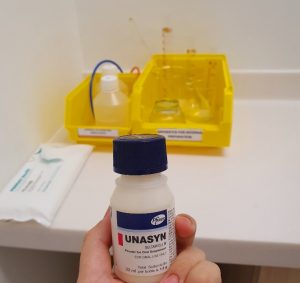
October 18, 2021, by Lee Mei Kee
Student Sharing: My Hospital Attachment during Summer Break
Article written by Tan Yi Yan, MPharm 2+2 Year 2 student. She did her internship at Gleneagles Hospital during summer break 2021.
How did I find the intern position?
When I was considering what to do with my three-month summer break, I chose to locate an intern to widen my perspective on the role of a hospital pharmacist. I looked up information on hospital pharmacies and emailed my resume to a few of them. I didn’t hold out much hope for a response because I was just a first-year student with limited knowledge and expertise in a hospital setting. Fortunately, I received a call from Gleneagles Hospital’s Human Resource department two days after sending my email. After a brief conversation, she sent me an email with a job application form that I needed to complete. After another two days, I was told that I had been offered the coveted opportunity to complete my internship there. I was both excited and nervous to start my internship there. However, my apprehensive attitude began to shift after a week.
What is my job scope?
As I was there to learn, there was no definite job scope for me. For the first and a half month, I was appointed to outpatient pharmacy and inpatient pharmacy for the remaining month. Observing how meticulous they were in managing the medications, from keying till dispensing to ensure that the correct medications with correct dosage were given to the correct patients, allows me to apply the professional practice standards which I have learnt. Most of the time, I was assigned to pack the medication according to the instructions on the label and sticked the ancillary label on it. Despite the fact that there are many medications that I have yet to study, I attempted to learn from the label on the bin stating the category of the medicines. Sometimes, when we received prescriptions from the Accident and Emergency (A&E) department, I would be given the chance of sending the medicines to the site which indirectly gave me the opportunity to see how it looks like. Like all jobs, there is always a peak hour and a non-peak hour. It left me a little tired but satisfied during the busy period.
What did I learn?
This invaluable internship has provided me with a wealth of knowledge. I learned the ins and outs of outpatient and inpatient pharmacy, from how to obtain a prescription to the dispensing role, how to read a prescription, the categories of the medications and their generic names as well as getting to know the important roles of a hospital pharmacist. I really appreciated learning how to prepare certain extemporaneous preparations such as potassium chloride mixture, glyceryl trinitrate ointment, and nitrofurantoin suspension. I can say that my practical knowledge was put to good use here because I was able to connect the skills and techniques learnt in my first year. The pharmacists and pharmacist assistants there were very friendly and willing to answer my questions as well as correct my mistake. One of the most memorable events I had was seeing how the Covid-19 vaccines were delivered to the PPVs (vaccine centres). To get the vaccines, I followed the chief pharmacist to one of the public hospitals and supplied the thousand vials of vaccine to the PPVs. During the transit of the vaccines to the PPVs, we were escorted by the police to ensure that the movement of the vaccines was secure. In addition, when handling the vaccination, we must adhere to the specific guidelines to ensure the quality and effectiveness of the vaccines. All of the vials must be stored in the vaccine carrier with ice packs surrounding them as well as a data logger and a digital thermometer to ensure the temperature stays between 2°C and 8°C. It was indeed the most unforgettable experience during my internship.
How did MPharm course help to prepare me for the internship?
In my Year 1, I learnt about dyspepsia as well as bacteria and fungi modules. I was lucky to have the chance to see the triple therapy treatment (one PPI + two types of antibiotics) prescribed by the doctor to treat the H. Pylori infection. Also, I have applied the knowledge of the types of tuberculosis antibiotics learnt. For antibiotics suspension, we only reconstitute the antibiotic powder if a patient has been prescribed it and most of them require refrigeration following reconstitution. The pharmaceutics lectures in BFI module have helped me in comprehending the reason for doing this.

One of the antibiotics suspensions that I reconstituted.
-
Post a comment
